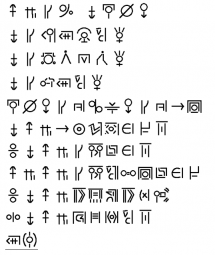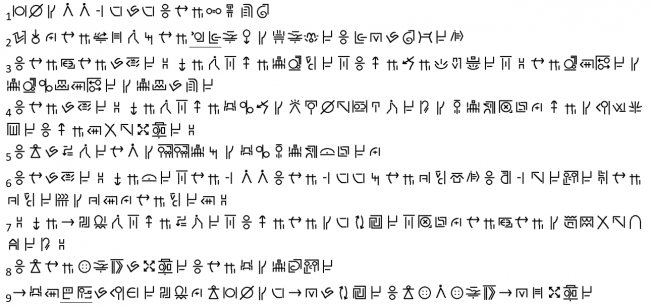Qihep
| Ul la Qīxēp ā xūc vol dī tȳn la dōb topīk |
| Welcome, students of Qihep! |
Qihep (in Qihep: Qīxēp [ˌkʷiːˈxeːp]) is a constructed fantasy language. It is an isolating language and uses a logographic script.
Phonology
- Main article: Qihep phonology
Script
- Main article: Qihep script
Morphology
- Main article: Qihep morphology
Syntax
- Main article: Qihep syntax
Lexycon
Dictionary
- Main article: Qihep-English dictionary
Everyday lexycon
- Eh: Hi, Hello
- Tū dōb des: Good morning (lit. May the morning be good)
- Lū dōb des: Good afternoon (lit. May the afternoon be good)
- Ān dōb des: Good evening (lit. May the evening be good)
- Pū dōb des: Good night (lit. May the night be good)
- Ma fut uś ro: Bye (lit. May you be fine)
- Ul (la) ma (la) dōb topīk: Welcome (lit. I/we receive well you)
- Ma dī ǵīv wūcin lo: How are you? (lit. How is your life?)
- Dōb dā: Well (lit. Good yes)
- Dōb ńikqem: Everything is fine (lit. Good everything)
- Ul uś sty: I'm feeling fine
- Dōbdōb dā: Very well (lit. Very good yes)
- Dōbśle dā: So and so (lit. Good bad yes)
- Śle dā: Not well, Bad (lit. Bad yes)
- Ēp: Thank you
- Ēpēp: Thank you very much
- Tyk nanqem: You're welcome (lit. This is nothing)
- Ul ma vorka: Please (lit. I pray you)
- Ma ul udvīn ro: I'm sorry, Excuse me (lit. May you excuse me)
- Ma wūcin ńīm lo or Wū ma dī ńīm lo: What is your name?
- Ul ... ńīm or Ul dī ńīm ...: My name is ...
- Ma wō rok smel ǵa lo: How old are you? (lit. How many years have you grown?)
- Ul ... rok smel ǵa: I am ... years old (lit. I have grown ... years)
The days of the week - Śotsēd dī bultsēd la
| English | Qihep |
|---|---|
| Monday | Komśotsēd |
| Tuesday | Upśotsēd |
| Wednesday | Pyśotsēd |
| Thursday | Dūśotsēd |
| Friday | Krajśotsēd |
| Saturday | Natbultsēd |
| Sunday | Pōbultsēd |
The months of the year - Qārtsēd
| English | Qihep | English | Qihep |
|---|---|---|---|
| January | komqārtsēd | July | gōqārtsēd |
| February | kōqārtsēd | August | gōgōqārtsēd |
| March | klojqārtsēd | September | epīkqārtsēd |
| April | āvqārtsēd | October | lisqārtsēd |
| May | rasesqārtsēd | November | lēdqārtsēd |
| Juny | srīqārtsēd | December | krajqārtsēd |
The seasons of the year - Roktsēd
| English | Qihep |
|---|---|
| Spring | Argōtsēd |
| Summer | Gōtsēd |
| Autumn Fall |
Arbȳtsēd |
| Winter | Bȳtsēd |
States of the world - Dīn elān la
- Main article: States of the World (Qihep)
The names of the states of the world are usually loanwords, so they are expressed by phonetic compounds, with normal syllables used for their phonetic value instead of their meaning. They are thus usually written with an underline. Names like state, kingdom, federation or democratic are not used directly but they are translated and not underlined.
The names of the states can be used as the relative adjective, and can be compounded to express the name of the inhabitants and of the related language.
- Itālia: Itālia vranvran, Italian population, Itāliavran, an Italian, Itāliaxēp, the Italian language
Some states have however developed an alternative adjectival form. This form will be used for the compound words, if they refer to the culture, while the name of the country will still be used when referring to the state.
- Doiclān: Doiclān vranvran, Doiclānvran, an inhabitant of Germany, but doicvran, a person speaking German, doicxēp, the German language
Dialogues
- Main article: Qihep dialogues
Texts
- Main article: Qihep texts
In the following section some examples of Qihep text with their transcription are presented.
Lord's prayer
| Qihep script | Transcription |
|---|---|
| ul la dī pāp, ma kōpdīn stā ma dī ńim ā śkedskyt des ma dī horvranmeś qin des ma dī wiś ā skyt des kōpdīn stā dī do i grūn stā dī do tykcin ma ul la tykbultsēd pām kreś fa si ī ma ul la dī smūś vorkreś si ul la ul la dī smūśmor mēmcin vorkreś fa ī ma ul la togrēxkȳt to pē mūh yt ma ul la śluk ud vrīskyt si āmen |
Babel text
1. tsāl dīn dī vranvran mē xēp rā xēp ī tȳn la mēm dum nūt sōl
2. tsēd o le tȳn la xīs ud qin sty tȳn la Śinār lān stā dī sbēnlān qum fa ī nārmeś rā sōlǵīv fa kōm
3. ī tȳn la drug tȳn la rā kāǵ fa "ma la qin si ul la trojsās skyt fa si ī ul la qem la pīr ō qōc fa si" tȳn la sās ā skām fa dī trojsās i kāx ā skām fa dī trojkāx rā nūt fa
4. ī tȳn la rā kāǵ fa "ma la qin si ul la byl i qem dī fīp kōpdīn fut dūbim fa pos dī fītrojkȳt tsel vor le ul la dī ńīm snāsy bly fa ī ul la ā nat fut rasjēq fa"
5. ī Pō rā dōlqin fa tȳn vran dī denden troj sty dī byl i fītrojkȳt piǵvor fa le
6. ī tȳn rā kāǵ fa "ma la piǵ fa si tȳn la mē vranvran ī tȳn la mē xēp xēp sty tȳn la do skyt ǵa kōm ī ńakmē tȳn la fut fajan fa kra tȳn la do skyt fa vol dī do ā le tȳn la skyt fa ā"
7. "ma la tyk prīc par qin si ul la dōlbim fa si ī ul la tȳn la dī xēp obmiś fa si tsel vor le tȳn la drug tȳn la dī xepsvūk nat fut enēm fa pos"
8. ī Pō tȳn la ńik lān to rā rasjēq fa ī tȳn la byl dī trojtān jan fa
9. tyk byl ā Bābēl rā ńīmkreś fa prīc par le Pō tsāl dīn dī xēp tykmeś rā obmiś fa ī Pō ńik vran ńik lān to tykmeś ud rasjēq fa
The Ant and the Grasshopper - Ań i pejūǵ
Ań gōtsēd o jy rā mar sty tȳn cāx bȳtsēd vor epīkvor fa le. Pejūǵ tsāl bultsēd on pej rē. Pejūg ań ū ka fa "ma wūprīc jyjy mar sty lo mā cāx ā mo qum fa ro". Ań rikāǵ fa "ma up bȳtsēd o enēm fa kra". Pejūǵ nat enēm fa ī tȳn nu pej fa kōm ī ań nu mar fa kōm. Bȳtsēd rā dūqin fa ī nev bim fa. Prīc par le tȳn caxnēccum sty pejūǵ ań dī dōm bim fa ī tȳn ka fa "ma ul ńakqem kreś fa ul caxvor fa le lo". Ań ka fa "ma wū ar gōtsēd o skyt sōl lo". Pejūǵ rikāǵ fa "ul ta pej sōl". Ań tyk prīc par kāǵ fa "dōb dā ma mo tsā si"
The Fox and the Grapes - Ew i el
Caxnēcim ew ǵe el rā piǵ fa tȳn yp rē yt tȳn qem nat fanēm kra. Dān o le tȳn vēbim sty tȳn mī fa "ul qem nat wiś qem nat smēl fa". Fatsel ā nat dūbim fa kra dī tȳn la obstātān vīnkreś fa sōl.
The Scorpion and the Frog - Sxȳr i grah
Rā ē sxȳr wa le, qem pibrēg stā sty ī qem pi ycbim fa vol. Qem grah piǵ fa ī qem grah ka fa: "ul ma vorka, ma ul śpom fa si, ul pi ycbim fa nec". Grah rikāǵ: "Nā, ul ma fut śpom fa fōr, ma ul fut xȳr fa fōr". Sxȳr tyk prīc par kāǵ fa: "Ul ma fut xȳr fōr, xup ul la fut cum fa fōr. Ul ma nat xȳr fa vol". Grah i sxȳr ygmēskyt fa ī sxȳr qem dī ogcō an yp fa. Dān o le qem la pi dī py stā stȳ sxȳr grah xȳr fa. Xocim grah sxȳr ka fa dān o le qem la bāccum sty: "Ul ma wūprīc ta xȳr fa lo". Sxȳr rikāǵ fa: " Ul ta snā ǵa ul la fu ta cum fa ā yt ul drugcin ba nat kin fa pos. Ul sxȳr ī tyk ul dī sōcincuv".




